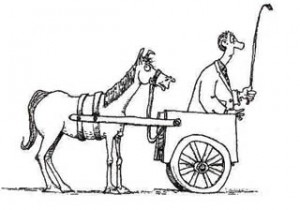Listening to the Alaska House Task Force squabble over their report brings back memories of that vintage Super Bowl bit of Americana evidencing that Americans are the most gullible creatures on Earth. Perhaps the cleverest application of that bit of MadAve genius might be credited to a comment by Cheryl Bezaire, “ The Lord’s Supper: Tastes Great / Less Filling”, but the leveraging of that piece of inanity is legion. 
What was so ironic about the ad (and it is as chilling now as it was almost 30 years ago) is that the public is suckered into accepting that the discussion is about beer worth drinking. Likewise, whatever the take of a particular faction on the Task Force, the fight on the right takes one thing for granted; education funding must be reformed because the money we spend is not being spent well. Yes, some argue we need to cut back, and some argue we need to spend smarter, but they all agree on a matter not in evidence, which is that we need to go on a education funding diet.
It is a bit frightening to suggest that Andrew Halcro is holding down the progressive end of an argument, but that is what happens when one gets sucked into the vortex of “Tastes Great / Less Filling” – even the most self-evident of acknowledgments appears sage as compared to hysterical pronouncements of self-fulfilling prophets. If you want to avoid a budget crisis, throwing away millions for redundant playgrounds and billions to bribe oil companies will tend to sap the zest out of any savings plan…
But what the whiners and the renders fail to recall is that most Alaskans pay a NET ZERO for all their State and Municipal services. Let’s just repeat that, shall we? Most Alaskans pay a NET ZERO for all their State and Municipal services. That is because Alaskans pay no income tax and their payment in other State and Local taxes are largely offset by their receipt of a yearly payment from the State. Yes, all the gnashing of teeth and the doom and gloom is over the nightmare of the residents of Alaska actually having to assume some personal responsibility with respect to State spending.
The upshot then is that the Task Force is hustling the Alaska public like Miller Lite hustled America; excuse us while we obscure from your view the fact that funding education is really not a problem in that all we have to do is PAY FOR IT. The argument over whether public education is an investment or a cost (or vice versa) takes advantage of the same ploy; it leads one, as a sheep to slaughter, into arguing over accounting fictions and missing the fact that in the largest sense it is neither.
And therein, perhaps, lies the rub, because the subtext is that the folk driving the Alaska Legislature not only don’t want to pay for anything, they want others to pay them to do what they want. Yes, they want the State to pay parents so that parents can shield their kids from things like science. Yikes!
Meanwhile, the Administration is knee-deep in it’s own form of “education reform”, arranging for millions to be spent on outside contractors by State Districts to engage in constructivist assessments. Yes, while on the one hand teachers are advised they must engage only in research based pedagogy, the Alaska Administration of Sean Parnell has launched a mandatory attack on Districts requiring the use of expensive proprietary non-research based ideological methods as for evaluating teaching staff, which teaching staff, already overworked, is now somehow expected to find an additional 10-15 hours a week to play make believe over developmental theories that are not research based.
Are our problems so intractable? We have bozos declining revenues on the one hand, while we have other bozos wasting money on the other hand. It would seem that the easy answer (though I do NOT subscribe to easy answers) wo0uld be to get the bozos off the bus, and as those bozos all self-identify as Republicans, the choice for Alaskans would seem to be clear. Unfortunately, things are never as clear as they appear to be, which is perhaps the text of the AEA President who cautioned against suggesting that there was anything Revelatory (the topic of the Whore of Babylon having been broached) about the Task Force discussions. No, our Dems would likely be just foolish (they certainly demonstrate such foolishness in their strident whining about assessments.)
The folk gathered around the Table at the Task Force barkfest were there because, at least ostensibly, they figured that they were so bright they could see their way to a “solution” where others could not (or were intentionally obstructing.)The humorous turn here being that we are seeing a race to the bottom between the Administration (reform) and the Legislature (cut.) Great Taste. Less filling.
Under the Table things were not perhaps so civil, because the hunt has been on for ways to defund public schools, and where you can’t make that fly under the flag of religious freedom, perhaps you can make that fly under the flag of freedom of educational choice, though the intent, to allow the inculcation of children with delusional commitments to the irrational and supernatural at public expense, is the same.
The Table in Ms. Bezaire’s comment was set for Pesach (Passover) which strangely enough celebrates religious freedom. And ironically enough, we once again have stood the concept of religious freedom on its head as we turn the idea of freedom from theocracy into a device to secure public funding of religious education. Round and round goes the nasty beer as we offer the bracha: Great taste! Less filling!

 Nor will her screed push those in the “middle” away from the Puritanism of Prevo et al, as would any rational adult attracted by such teenage angst? Would anyone pursuing a progressive agenda wish to really be associated with this tumultuous bellowing over whose musty magician does better magic? Is this even remotely appropriate?
Nor will her screed push those in the “middle” away from the Puritanism of Prevo et al, as would any rational adult attracted by such teenage angst? Would anyone pursuing a progressive agenda wish to really be associated with this tumultuous bellowing over whose musty magician does better magic? Is this even remotely appropriate? Look on those kids (even the one picking his nose.) Not one of those cute children understand what took place on 9/11/73. Not one sees the stark irony in howling about the injustice of one 9/11 while ignoring the other. Of my favorite authors, perhaps Vonnegut captures the irony of this season best. Like Vonnegut we seem to be masters of temporal distortion and disorientation, accomplished at auto-hypnosis and selective amnesia. As I sneak a peak in to the future, this is what I see for future Septembers, “9/11” grief celebrations that extol military virtue not unlike Russian Mayday celebrations.
Look on those kids (even the one picking his nose.) Not one of those cute children understand what took place on 9/11/73. Not one sees the stark irony in howling about the injustice of one 9/11 while ignoring the other. Of my favorite authors, perhaps Vonnegut captures the irony of this season best. Like Vonnegut we seem to be masters of temporal distortion and disorientation, accomplished at auto-hypnosis and selective amnesia. As I sneak a peak in to the future, this is what I see for future Septembers, “9/11” grief celebrations that extol military virtue not unlike Russian Mayday celebrations. The timing of the holidays this year poses much the same questions as the Holocaust did for our grandparents. Are there any innocents, and can you forgive without being forgiving; can you expect atonement from others without owning your own misconduct? What responsibility, if any, does the victim have in his own demise? In a perfect world perhaps the taunt, “You asked for it,” would lose all meaning, but in the world in which I live, a world peopled by those with long memories, simmering resentment and deep anger, owning up to one’s responsibility seems unappetizing to people who wear the red, white and blue.
The timing of the holidays this year poses much the same questions as the Holocaust did for our grandparents. Are there any innocents, and can you forgive without being forgiving; can you expect atonement from others without owning your own misconduct? What responsibility, if any, does the victim have in his own demise? In a perfect world perhaps the taunt, “You asked for it,” would lose all meaning, but in the world in which I live, a world peopled by those with long memories, simmering resentment and deep anger, owning up to one’s responsibility seems unappetizing to people who wear the red, white and blue.


 A year or so ago UAA Nursing Students decided to put the question of whether the recommended daily allowance (RDA) of Vitamin D would produce adequate blood levels to the test and found that the RDA came nowhere close to ensuring adequate Vitamin D. Alaskan doctors are now suggesting 4000 IU daily (combined with Magnesium and Calcium) while many foolish Alaskans complain or suffer from the conditions
A year or so ago UAA Nursing Students decided to put the question of whether the recommended daily allowance (RDA) of Vitamin D would produce adequate blood levels to the test and found that the RDA came nowhere close to ensuring adequate Vitamin D. Alaskan doctors are now suggesting 4000 IU daily (combined with Magnesium and Calcium) while many foolish Alaskans complain or suffer from the conditions  Dr. Gabor Maté argued to Alaska that, “The first question in addiction is not why the addiction, but why the pain? And if you understand a human being’s pain, you cannot look at their genes.” You can listen to his presentation at
Dr. Gabor Maté argued to Alaska that, “The first question in addiction is not why the addiction, but why the pain? And if you understand a human being’s pain, you cannot look at their genes.” You can listen to his presentation at